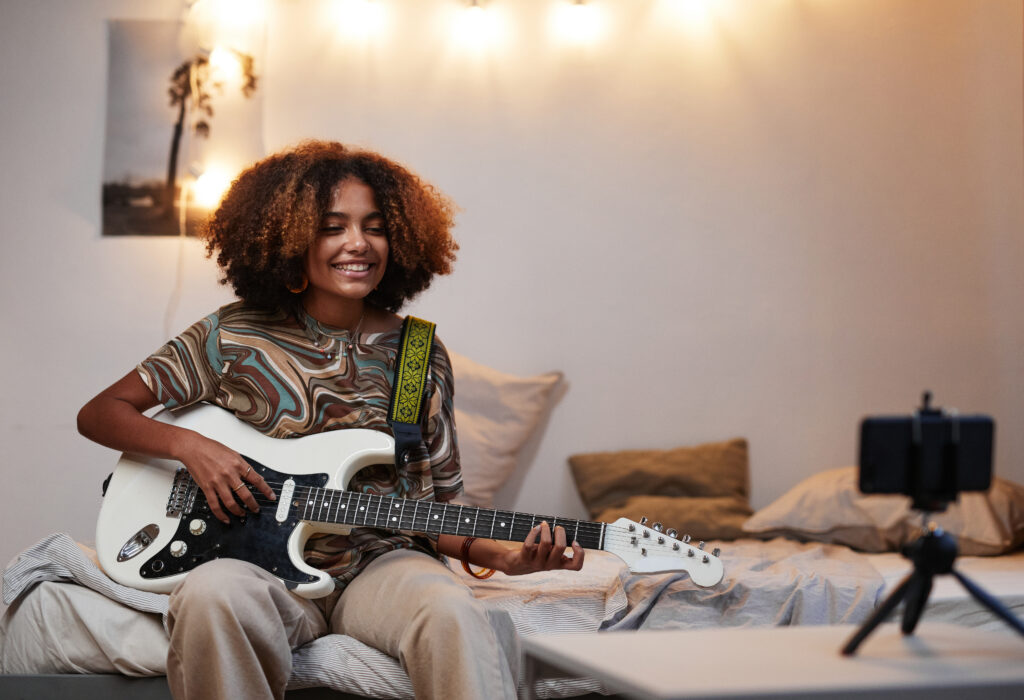
4 Tips for Being a Better Player in 2023
This article “Playing Better Guitar In 2023” was contributed by guest writer Gary Heimbauer for Guitar Tricks and 30 Day Singer.
As I write this in December of 2022, it’s that time of year when we reflect on the past. We think about what worked, what didn’t work, and what we would like to do differently in the New Year.
I’d like to share some tips for becoming a better guitar player in 2023. These tips are also applicable to anyone that plays the guitar – at any time!
Tip #1: Establish a daily practice habit.
“If you’re into what you’re playing, that’s the most important thing”.
– James Hetfield, Metallica
Before getting into the nitty gritty of different practice strategies, and how to divide your time when you’re practising, it’s important to first establish a simple daily habit of playing the guitar. Especially when first starting out with guitar lessons. We are what we do on a daily basis.
Start by following your interest and inspiration, and doing whatever brings you the most joy on the guitar. Sit down (or stand up) and play your guitar with your undivided attention every day. What starts as a commitment becomes a part of your lifestyle.
An automatic habit in your life that you look forward to on a daily basis. Today you are a guitar player. Tomorrow you’ll be a guitar player. And the day after that you’ll be a guitar player too.
Practice Makes Perfect
Why is this important? Daily practice means that there is continuity to your craft and your growth. What you work on today, and all of the progress, insight, and growth that happens in today’s session requires repetition and reinforcement for it to stick and become part of your playing.
So many times in my own journey I’ve had an amazing session where I broke new ground. But, by failing to create the time and space in the following days, I completely forgot what I had done. I then had to start over with whatever it was I was working on.
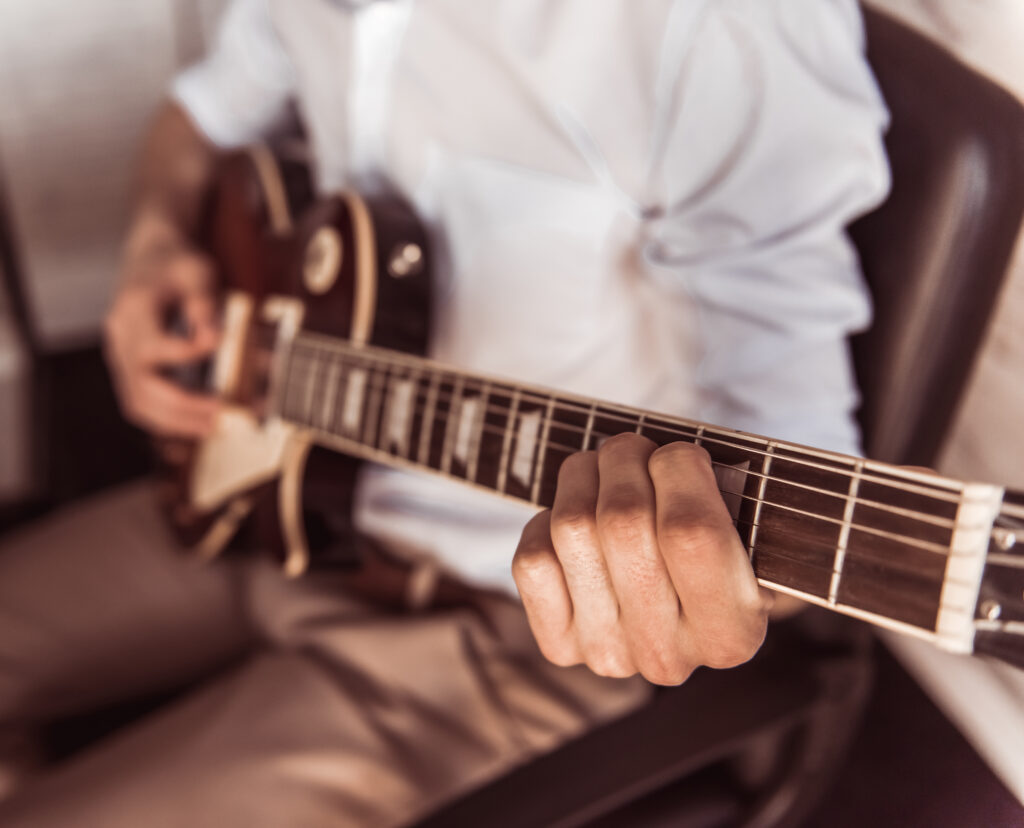
After you establish a committed daily practice, you’ll then have the patience and fortitude to be more deliberate and strategic with your practice to maximize its benefits. You might start with using a guitar tuner, practising the pentatonic scale, and then moving on to some easy guitar songs.
But inspired daily practice regardless of the content of that practice will bring so much great benefit in and of itself.
Make Time For Music
If you are like me and have a very flexible work schedule and don’t have a family that you’re responsible for, you might practice at a different time each day. If you have regularly scheduled daily commitments, then you will have to approach your guitar time in the same way.
Using a calendar? Create a repeating event and show up to it on time. Just like you would with any other event! The more you do the things that bring you joy and the more you commit to taking care of your own needs, the better you’ll be out there in the world for others.
It’s not a selfish thing, so try your best to show up for yourself.
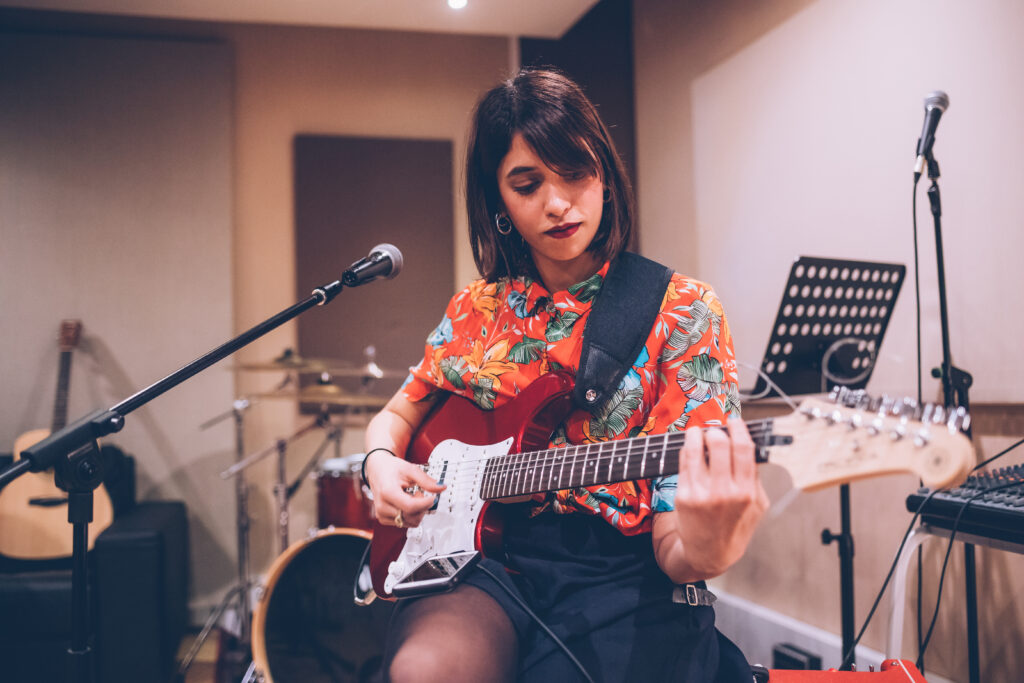
Tip #2: Play With (and For) Others
“Guitar is the best form of self-expression I know”.
– Slash, Guns N’ Roses
So many beginner guitar players at various points in their journey have the same burning question. This question often stresses and burns them out. That question is “what should I practice?”. The people that are not asking this question are the people that are out there performing music with and for others, or recording music. Because the answer is very obvious. Practice for whatever it is you are playing, performing or recording, with and for others!
The main reason to play with and for others isn’t only so that you become a better player. It’s mainly because playing with others is what this endeavour is all about!
Music is something to be shared with other people. All of the music you’ve ever heard, you’ve only heard because someone shared it with you. They created it either alone or with a band, and then they recorded it and performed it.
That union between performers and listeners is everything. It’s very hard to stay inspired and get the most out of this journey if music is something you do alone in your room. Get out there and play and the power of music will only become stronger and more lasting in your life.
Even getting together with some buds and strumming a few guitar chords can be enough to spark inspiration. Many questions you have will be answered for you as you expand your repertoire and play songs in a social way.
Develop Essential Skills
In addition to the fact that playing with others forces you to work on certain skills, learn songs, and get your playing performance-ready, it also helps you develop skills that you can’t develop on your own.
You can learn about playing well with others, locking into a groove, controlling your volume and tone, and performing! There is also a thing that happens where the energy of a live performance leads you to play better and with more intensity than you are able to alone in a room!
Go Online
Can’t find others to play with nearby? There are billions of people on the internet that you can share music with through video and audio recordings. Although this experience isn’t as powerful as getting out there in the flesh, it gives you a similar kind of motivation.
You have a project that you are working on completing and sharing so that others can listen to and share with you. Even if you aren’t together with them.
I’ve had similar growth spurts and periods of sustained inspiration and hard work at the instrument in service to recordings and videos, as I have to work on songs to perform in person.
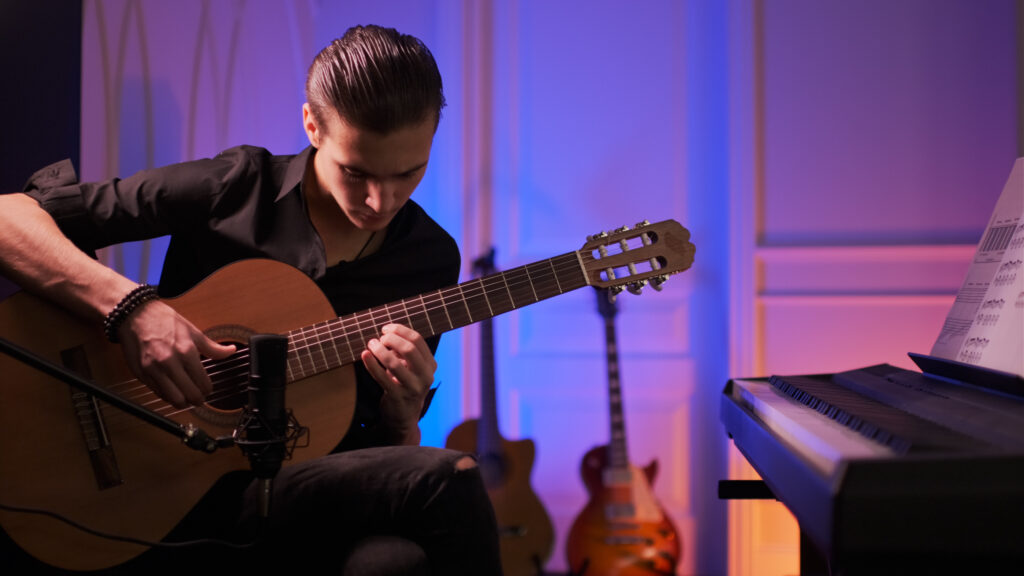
Tip #3: Jam with Yourself
“Sometimes you’ll want to give up the guitar. You’ll hate the guitar. But if you stick with it, you’ll be rewarded”.
– Jimi Hendrix
You don’t necessarily need other humans to become part of a musical ensemble. With today’s technology, you can play along to backing tracks, create loops with a loop pedal to play over, play with a metronome, or record multiple tracks. And you can do this all by yourself.
Although you might not get the same sense of social/emotional connection that you would whilst playing with others, so many of the skills that you need, and that you develop by playing with others, you can now work on even when you’re alone!
By working with a looper, you can develop both your rhythm and lead skills. You’ll also get to listen back, and record, and record, to hone your craft. Backing tracks give you the experience of being part of a group of musicians and learning how to fit into that role. Metronomes will greatly improve your ability to play everything in relation to a beat.
And finally, multi-track recording gives you the opportunity to think like an arranger and understand how musical pieces can fit together. By doing multiple takes of something, you really work on the finer details of your playing and become a better player in the process.
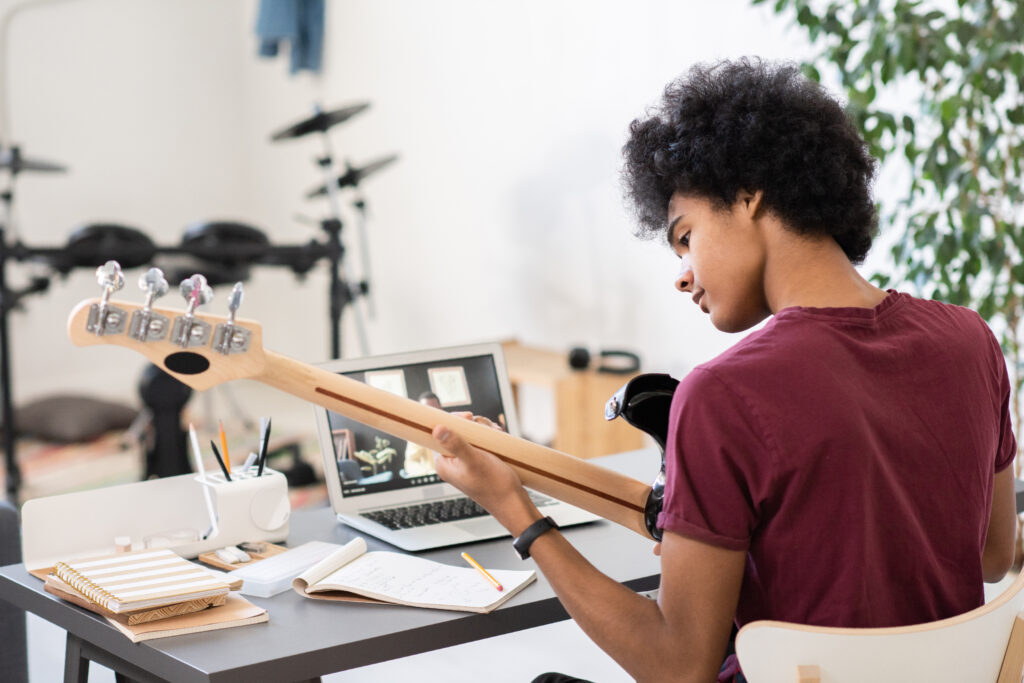
Tip #4: Learn and Create by Ear as Much as Possible
“If you want to be a rock star or just be famous, then run down the street naked, you’ll make the news or something. But if you want music to be your livelihood, then play, play, play and play! And eventually, you’ll get to where you want to be”.
– Eddie Van Halen
Many people starting out with music can spend years without ever trying to learn by ear. They rely on tablature or notation when learning how to play the guitar. This is especially true today as there is a tutorial, TAB or sheet music available online for almost any song you can think of.
This can really stunt a player’s growth as the ear is the ultimate tool we have as a musician. Music is a language. Native speakers of any language learn the language by ear without studying the mechanics or the rules. Or even learning to read until years later.
By learning a language by ear, you capture all of the nuances, the inflexions, and gain intuitive confidence that isn’t so concerned with right or wrong. As much as it’s concerned with getting the point across, or conveying an idea or emotion.
Hear Something, Play It Back
By learning music by ear we are creating a connection between what we hear, both externally and internally, and our fingers and the instrument. We start to develop a sense of how the fingers need to move to create a sound that we hear.
Eventually, there is a union there – and it’s as if you are singing through your instrument. The ultimate goal is to be able to hear something and play it immediately. This can begin on a basic level and get more and more sophisticated throughout a player’s journey.
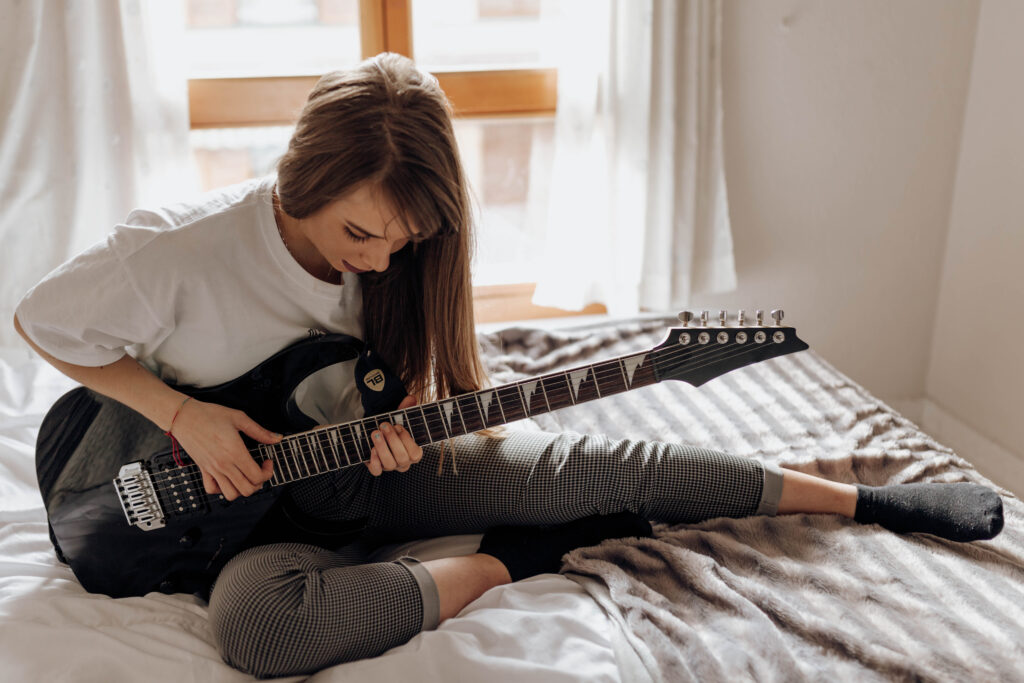
You can start this process at a very simple level. Some things I’d recommend are first figuring out a song melody that is deeply ingrained in your mind. For instance, Happy Birthday. See if you can play the melody for Happy Birthday in a few different keys, and in a few different spots on the fretboard.
Try to also learn a simple melody by ear from a song you know and love by listening to it. Then looping one phrase at a time, humming it first, and then trying to find it on the fretboard! You can do the same with very simple song riffs.
Deciphering Chord Progressions
You also want to do the same thing with chords. Find a simple song first that just has 3 or 4 chords, and see if you can first hear the bass notes or lowest notes of those chords. Then figure out if they are major or minor.
Take advantage of the readily available tools that will let you slow the music down without changing the pitch. This is built into YouTube now in the settings on each video! You can go as slow as 25% of the original speed.
After learning something by ear, you then want to make sense of what you learned regarding what key it’s in, how it relates to the chord that is being played, what the intervals are, etc. However, this is not necessary to get started, and it’s secondary to just hearing and playing the sounds.